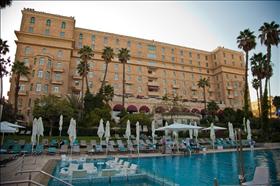Chief Rabbinate rewrites kashrut regulations to be in accordance with Israeli law
A Revolution in the Chief Rabbinate’s Kashrut Regulations, following Hiddush’s Battle
The Chief Rabbinate updates its kashrut regulations for hotels, hostels and event halls to be in accordance with Israeli law. Finally, kashrut certification will only be granted upon the basis of whether the food is kosher or not!
08/03/2015 18:29
Tags: Chief Rabbinate · kashrut certification

King David Hotel in Jerusalem
Permitted: Movie Screenings, Photography, and Music at Hotel Events on Shabbat. Permitted: Putting up Fir Trees for non-Jewish Holidays at the end of the Gregorian Year. Hiddush CEO Rabbi Uri Regev: “After decades, the Chief Rabbinate ended its policy of religious coercion related to Shabbat observance and Christmas. The kashrut regulations for hotels, hostels and halls, are now finally in line with the law, and truly deal only with matters of kashrut.”
The new kashrut regulations issued by the Chief Rabbinate for hotels and hostels override former prohibitions against photography, movie screenings and playing music on Saturdays at special events, as well as the requirement that only non-Jewish receptionists work on Saturdays. The new regulations also eliminate the ban against Christian holiday symbols, such as Christmas trees, in hotels and halls during New Year's season. For decades, the Chief Rabbinate had threatened to rescind kashrut certifications from hotels that did not comply with those requirements.
The Chief Rabbinate drafted these new regulations after a long correspondence with Hiddush President Rabbi Uri Regev, Esq. who threatened to appeal to the Supreme Court if the former, illegal regulations were not revoked. Regev expressed deep satisfaction with the changes, saying that “we have finally reached the point at which kashrut standards for hotels, hostels and halls have been written in adherence to the law; and only deal with kashrut, rather than the Rabbinate’s religiously coercive agenda regarding Shabbat and Christmas.”
We would welcome the Attorney General and the Ministry of Religious Services clarifying for the Chief Rabbinate that it too must follow Israeli law, and that its regulations must be within legal limits.
The story began in December 2013 when Religious Services Minister Naftali Bennett and Deputy Minister Rabbi Eli Ben-Dahan, both of the Jewish Home party, declared the establishment of “kosher police” to prevent defrauding and misleading the public about what is kosher. Following this announcement, Rabbi Regev appealed to Bennett, Ben-Dahan and Attorney General Weinstein demanding that they take action to prevent abuses of the law made by the Chief Rabbinate itself in kashrut regulation. Rabbi Regev referred to the Chief Rabbinate’s kashrut standards and regulations for hotels and hostels and event halls, including conditions related to Sabbath observance and a prohibition against the use of Christian symbols, regardless of establishments’ kashrut standards for their food.
The Chief Rabbinate had been in violation of the Kosher Fraud Law for many years, which states that that “the kashrut inspector should only consider standards of kashrut alone in certifying an establishment as kosher.” According to a Supreme Court ruling, basing an establishment’s kosher certification upon considerations such as Sabbath observance or modesty was in contravention of the law. Regev notes that “the Court specifically wrote about preparations for New Year's Eve, placing Christmas trees in hotel lobbies, playing music and using microphone on Saturdays, and employing a Jews as receptionists on Saturdays, etc.; and explicitly rejected the stance that such acts should have any bearing upon whether hotels receive kashrut certification. Hiddush’s pursuit of this legal matter was unfortunately necessary, in part, because the hotels themselves dared not stand against the Chief Rabbinate’s extortion, for fear of retaliation or retribution.”
Rabbi Regev's correspondence with the Chief Rabbinate advisors stretched for over a year. It took this long for the Rabbinate’s legal advisors to review the legal requirements. Finally, last week, the Chief Rabbinate’s attorney Harel Goldberg wrote to Hiddush that following Rabbi Regev’s comprehensive legal research and outline of Hiddush’s demands, the Chief Rabbinate had approved a series of changes in the kashrut regulations for hotels, hostels and event halls. Here are the main changes:
- Repealed the ban on video devices, audio and musical instruments at events held in hotels on Saturdays, except when food is served.
- Repealed the restriction upon only having non-Jewish receptionists to receive payments on the Sabbath. From henceforth, this regulation applies only to activities related to ordering food and paying for it.
- Repealed the regulation that all hotel elevators must be run as “Sabbath elevators” on Shabbat. From henceforth, only the elevators used in food preparation and delivery on the Sabbath must be operated as “Sabbath elevators”.
- Repealed the ban on the use of Christian holiday symbols, such as putting up fir trees for Christmas and New Year’s season.
Hiddush President Rabbi Uri Regev responded to the dramatic decision, saying “The significance of these changes is dramatic. Israelis and groups of tourists will now be able to hold conferences and events in hotels and event halls on weekends with no restrictions on photography, projection and playing music. We finally put an end to the absurd phenomenon of hotels not being allowed to show respect to groups of pilgrims who come annually en masse to Israel, by simply putting up Christmas trees to mark their holiday season.”
According to Regev, “We would welcome the Attorney General and the Ministry of Religious Services clarifying for the Chief Rabbinate that it too must follow Israeli law, and that its regulations must be within legal limits. Hiddush,” stressed Regev, “will monitor these developments, and ensure the new regulations are implemented. We will not hesitate to appeal to the Supreme Court if we find that the regulations have been changed on paper, but the reality has not.”